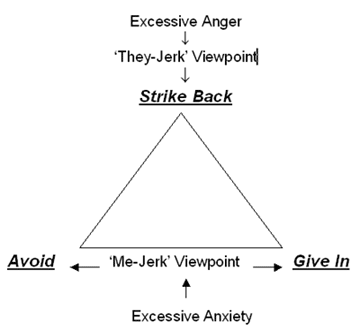Newsletter
Working Well with Difficult People
Staying Sane and Effective by Shifting From Defensive to Collaborative Conversations
"Discussion is an exchange of knowledge, argument an exchange of emotion."
- - Robert Quillen
We all work with them. Difficult people are aggressive, critical or just plain bull-headed. They derail our best-laid plans and block us from important objectives. Then they do it again. These chronic frustrations can take a serious toll on our productivity and peace of mind. In one survey, researchers found that difficult relationships caused 53% of respondents to lose time worrying, 22% to decrease efforts, 10% to reduce hours and 12% to leave the company. Such demoralizing effects can ripple through teams and whole organizations. Clearly there is a huge impact on the bottom line.
How can we minimize this damage and be more effective with people who keep striking a raw nerve?
Stop Blaming and Labeling
Our knee-jerk impulse with difficult people is to blame them right back. We label them with permanent negative traits: "Obsessive control freak ... selfish ... arrogant." This labeling encourages the other person to label you, and the attack and defend cycle can harden into a self-defeating relationship. The behavior you wish to extinguish flares even more.
Consider a Personal Style Difference
We all have preferred styles in approaching tasks. Behavior you find annoying and obstructing may simply be the person's most comfortable way of working - different from yours, but no less valuable. Your "difficult" person may actually share your intentions, but uses different strengths to reach the common goal. Awareness and appreciation of diverse styles can open pathways to bridge these differences. When a wider array of strengths is put into play, work collaborations become richer.
Give Up Being Right; Explore the Other Person's Story
Insisting that your reality is the only sensible one keeps relationships stuck. Assume their reactions somehow make sense, and find out exactly how and why they see things as they do. Shifting to an open, inquiring stance disarms criticism and deescalates tension. Offering validation and appreciation (not easy when you're steamed) sets the stage for a shift from a defensive to a more productive exchange of information.
Keep Your Composure; Revise Your Story
When we act in the heat of strong emotion, we can't really listen. The following diagram depicts how emotions drive different types of defensive behavior.
Pyramid of Defensiveness

When we're caught up in anger, we narrowly see the other person as the sole cause of the problem. Such a rigid viewpoint fuels our urge to regain control by striking back to stop the offending behavior.
When anxiety is our prime response, we lean toward a self-blame mode where we automatically focus on our own flaws. Such a perspective can fuel attempts to reduce the discomfort by avoiding the difficult person or acquiescing to demands.
Human beings are programmed to react with fight or flight when we perceive a threat. Yet threats in work situations rarely involve physical survival. Most often we are dealing with the perception of threat to our identity or sense of worth and competency. When our decisions are impulsive�aimed at quickly reducing these powerful emotions, we often end up regretting our actions.
At such moments it's pivotal to slow down and tune in to the story you're telling to yourself about the meaning of the difficulty. What exactly is this threat? Is this person always difficult? What might account for this difficult behavior right now? Could they be temporarily overwhelmed by circumstances? Is there positive intent behind their actions that may not be easily visible?
Rethinking this initial story and considering new perspectives allows access to a wider variety of options for responding. You're then in a much better position to choose a calmer, more deliberate and useful approach. Keeping composed is the basis for productive, collaborative conversations that result in greater clarity and respect.
Jay K. Cherney, Ph.D
